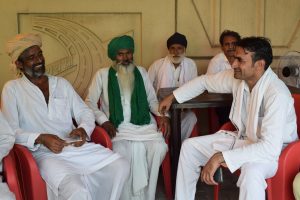On January 5, Prime Minister Narendra Modi’s motorcade was stuck on a flyover in Punjab for around 20 minutes. The incident has been described by India’s Ministry of Home Affairs as a “major lapse in the security of the PM.”
Soon after the “lapse,” Modi made a sarcastic remark to local media suggesting that the episode was a deliberate attempt by Punjab’s Congress government to stall the cavalcade, which was only stopped to avert any security fiasco. The incident soon became election campaign material in the hands of Modi’s Bharatiya Janata Party (BJP) and used by pro-Modi media channels to suggest an intentional and massive security breach.
Punjab is among five states that are due to vote in state assembly elections soon and with election campaigns gathering momentum and political leaders using every opportunity to attack their rivals, the incident involving Modi’s motorcade has become highly politicized.
The BJP has pointed to a Congress conspiracy. “We know Congress hates Modi, but today they tried to harm the PM of India,” BJP leader Smriti Irani said, accusing the Congress, which rules Punjab of having “khooni” (murderous) intent. How did the farmers who blocked the road know the route the prime minister’s cavalcade was to take, she demanded to know, suggesting that Punjab’s Congress government had a hand in the security lapse.
The main parties in the electoral fray in Punjab are the ruling Congress party, the BJP, the Aam Aadmi Party (AAP) and the Shiromani Akali Dal (SAD). While AAP is known for promising freebies, other parties have also chosen the freebie route to secure votes.
Days after AAP chief Anand Kejriwal promised all adult women a sum of 1,000 rupees (approximately $13.5) per month if his party was elected to power, the president of the Congress party’s Punjab unit, Navjot Singh Sidhu, made a counter-offer of 2,000 rupees for homemakers if his party was elected.
The Punjab unit of the Congress party has witnessed much infighting in recent years, culminating in Amarinder Singh resigning as chief minister and from the party in September. The party then appointed Charanjit Singh Channi, a Dalit, as Punjab’s new chief minister.
Channi’s appointment was widely seen as a political masterstroke.
Dalits comprise 32 percent of Punjab’s population, the highest in India. Despite their sizeable numbers, the state has never had a Dalit chief minister before. Channi’s appointment to the top post could therefore bring the Congress Dalit votes in the state.
However, Dalits have rarely voted as a block in Punjab. And also, the electoral scenario began to change rapidly soon after.
In a move widely seen as aimed at winning back the support of farmers from Punjab and Uttar Pradesh, another state due to vote in assembly elections in a few months, India’s Bharatiya Janata Party (BJP) government repealed three farm laws.
The farm laws, which were enacted in 2020 without consulting farmers’ unions were widely unpopular and triggered massive protests across the country. Tens of thousands of farmers particularly from Punjab and western Uttar Pradesh camped on New Delhi’s outfits for almost a year.
With the BJP repealing the farm laws ahead of elections, other parties jumped into the fray with freebies and other promises.
In the 2017 election in Punjab, the Congress won 77 of 117 assembly seats and Captain Singh took over as chief minister. The BJP along with its alliance partner, SAD, performed poorly, winning just 15 seats. Although it is a new party, AAP secured a vote share of 23.8 percent to win 20 seats.
This time around, SAD, a Sikh party, has announced an alliance with the Bahujan Samaj Party (BSP), a party that has support among Dalits. It has hinted that it will be parting ways with the BJP.
Patron of SAD and a five-time chief minister of Punjab, Parkash Singh Badal has warned voters against dangerous conspiracies aimed at installing government stooges. He was pointing to the BJP’s recent move to take control of the Delhi Sikh Gurdwara Management Committee to dilute the separate and unique religious identity of Sikhs.
The electoral arena has been roiled further with two cases of alleged ‘sacrilege’ in Punjab. On December 18, a man who allegedly entered the inner sanctum of the Amritsar Golden Temple, the holiest of shrines for Sikhs, was beaten to death by devotees. A day later, another man was lynched to death at a gurudwara at Kapurthala for attempting sacrilege.
Then on December 23, a blast inside the Ludhiana city court complex resulted in the death of one person. Five others were seriously injured. The blast has triggered accusations and counter-accusations. Opposition parties in the state have criticized the ruling Congress of failing on the law and order front, putting the Congress on the defensive. It is in this context that the fuss over Modi’s motorcade must be seen.
Recent incidents evoke memories of a bomb blast on January 31, 2017 at Bathinda’s Maur Mandi. That blast, which killed seven people, happened days ahead of the 2017 state assembly election and completely changed the election narrative. It paved the way for the defeat of the ruling SAD-BJP coalition.
Following the recent incidents of alleged sacrilege at Sikh shrines, the Punjab government has issued directions to police to provide round-the-clock security at all gurudwaras, temples, mosques and churches.
Opinion polls predict a hung assembly. AAP is expected to get the largest number of seats but could fall short of a majority in the house, with the ruling Congress emerging the runner-up. The BJP is not expected to do well.
But these are still early days.
Religious sentiment has been stirred and it will take just one incident to change the electoral tide.

































